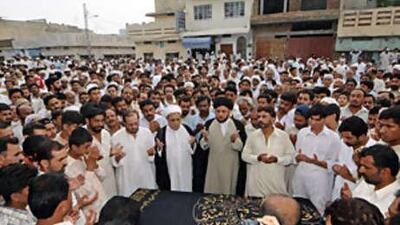ISLAMABAD // Pakistan stepped up security at all military installations after a double suicide blast outside at its largest arms factory killed 67 people. Police said today that they arrested a third suspected bomber not far from the scene. They also recovered a suicide jacket from a nearby mosque and seized explosives. Yesterday's attack, one of the worst in Pakistan, adds to turmoil from political squabbling that is threatening to tear apart the ruling coalition now that Pervez Musharraf has stepped down as president.
The two main parties - traditional rivals who united to force him from power - were preparing for a make-or-break meeting today that could see the party of prime minister Nawaz Sharif, quit. He is demanding all judges fired by the one-time military ruler be quickly reinstated, something the Pakistan People's Party, the largest bloc in Parliament, has not yet agreed too. The two sides also diverge on who should succeed Mr Musharraf as president and whether he should face trial. One of the biggest challenges for the five-month-old government, however, will be tackling extremist violence.
An umbrella group of the Taliban claimed responsibility for yesterday's blasts, saying it was to avenge the army's air strikes in Bajur. Police and factory officials put the death toll for Thursday's blasts in Wah, a city 35 kilometres west of the capital Islamabad, at 67 today. At least 102 people were wounded. More than 400 people have died in 20 suicide bombings in the last three months. "The army and police arrested a suspected bomber not far away from scene of the attack," said a local police official, Mohammed Saeed. "They also recovered a suicide jacket from a nearby mosque and seized explosives."
It was unclear whether the suspected would-be bomber was found with the explosives or why he apparently failed in his mission. Workers were streaming through two gates of the massive weapons complex yesterday during a shift change when the bombers attacked outside the walls. The force of the explosions knocked many people to the ground and sprayed others with shrapnel. "It was like a doomsday," said Ghaffar Hussain, whose nephew was killed. "We are finished, we are ruined," he said, tears rolling down his face.
The attacks were a blow to Pakistan's military, which is fighting militants in the troubled Bajur tribal region near Afghanistan, where Taliban, al Qa'eda and local Islamic militants are believed to be hiding. The fighting there has displaced more than 250,000 residents. "The army has killed hundreds of innocent people, and we attacked it to teach it a lesson," said Maulvi Umar, a spokesman for Pakistani Taliban groups, threatening more violence unless the military ceased its operations.
Mr Musharraf resigned on Monday to avoid the humiliation of impeachment after nearly nine years in power that began with a bloodless coup. While the former military commander was considered a vital member of Washington's war-on-terrorism coalition, the new civilian government drew US criticism for giving priority to striking peace deals with militants when it came to power. The peace effort was popular with many Pakistanis who are angry over the conflict's toll on civilians. But it has met only limited success, and the government is again pursuing military operations against militants in the rugged region along the Afghan border.
* AP

